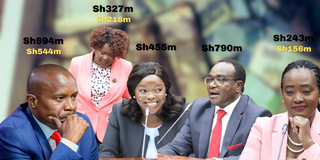
Nominated CSs Prof Kindiki Kithure, Alice Wahome, Dr Deborah Barasa, Julius Migos and Soipan Tuya.
President William Ruto’s Cabinet nominees faced a tough time yesterday as their actions during their 21-month tenure in office before they were sacked returned to haunt them.
The conduct of police during the anti-government protests, the Shakahola massacre and the bodies found at Kware in Nairobi became Interior Cabinet Secretary nominee Kithure Kindiki’s albatross on his appearance as the first candidate to be interviewed by the vetting panel.
Prof Kindiki faced a barrage of questions from members of the National Assembly Speaker Moses Wetang’ula-led committee as they sought explanations over State-sanctioned abductions, violations of human rights, and killings of people by the police.
Prof Kindiki, who is seeking a second bite at the lucrative and powerful ministry, was also taken to task on why he deserved a second chance in the midst of security challenges that the country faced during his 21 months in office.
Insecurity in the North Rift, police reforms and lack of coordination among security agencies also featured prominently during the two hours and 10 minutes that he faced the vetting panel.
An increase of Prof Kindiki’s wealth by a staggering Sh100 million in 21 months also came under scrutiny, with MPs seeking to know how every coin was earned.
Parliament received 11 petitions challenging the nomination of Prof Kindiki, with Mr Wetang’ula saying they were all forwarded to the nominee and he responded in writing.
The nature of why the 11 petitioners are opposed to Prof Kindiki were not disclosed by the vetting panel. Minority Leader Junet Mohamed pulled no punches in his demands for clear answers from the 53-year-old professor of law and a father of three on why he deserved a second chance despite the stain in his tenure.
“During Azimio protests [last year] 75 people were killed. In the recent [Gen Z protests], 50 people died and your voice wasn’t heard. What is it that you are going to do differently this time?” Mr Junet posed.
Mr Ichung’wah wondered how, in a society with an elaborate security administration structure ranging from Nyumba Kumi officials to the National Intelligence Service, the killing of over 40 people could go undetected in such a crowded area as Eastlands.
“There seems to be a complete security breakdown; we had the Shakahola massacre and Kware killings,” Mr Ichung’wah said.
Pokot South MP David Pkosing took Prof Kindiki to task over a raft of proposals the former CS made to end banditry in the North Rift region, saying, none have been implemented.
Mr Pkosing said the relative calm that is prevailing in the region, especially in his constituency should not be construed to mean a permanent peace has been achieved hence the need to fast-track some of the plans the CS had outlined.
On his increase in wealth by Sh100 million, Prof Kindiki said he had not benefited from any government tender or any illegal proceeds. He explained the increase as coming from his law firm, his salary, two homes in Nairobi and Tharaka Nithi, and savings in Saccos and banks.
On police brutality and abuse of human rights, Prof Kindiki said that, when he was appointed for his first tenure, he communicated clearly that the Kenya Kwanza administration does not condone human rights abuses and had adopted a policy of zero tolerance to abductions.
“During my tenure, I made it clear to the police that abductions are against government policy, the Constitution and international law,” Prof Kindiki said.
Lands, Public Works, Housing and Urban Development Cabinet Secretary nominee Alice Wahome found herself in a tight corner as MPs questioned her performance during her 21 months in office.
Ms Wahome faced a barrage of questions from members of the committee on the housing project, land grabbing, cartels at the Lands Ministry and the status of digitisation services at the ministry project, land grabbing, cartels at the Lands ministry and the status of digitisation services at the ministry.
Her frosty relationship with the National Land Commission (NLC) also came to foe as the vetting panel accused the former Kandara lawmaker of meddling in the affairs of the institution.
The widely rejected and subsequently withdrawn Land Laws (Amendments) Bill, 2023 also came back to haunt Ms Wahome as the MPs accused her of trying to weaken the NLC through the proposed legislation and consolidating power in her office.
Ms Wahome was asked to come clean on the money collected from Kenyans through the Housing Levy but has since been invested as Treasury bonds even as housing projects across the country continued to stall.
The MPs pointed out that, despite the grand launch of the affordable housing initiative by President William Ruto, construction has either stalled in some places or completely failed to take off in others.
“You wanted this Bill [Land Laws (Amendments) Bill, 2023] so that you can have more powers to encroach on the roles of the NLC. Why do you want a piece of land in Migori to be determined by a minister whether it’s a freehold or not?” Mr Mohamed asked Ms Wahome.
The Suna East MP further questioned the former minister on the thorny issue of missing title deeds at the ministry that either disappear or change hands at the expense of poor landowners who end up losing their properties.
“The issue of disappearance of files, when will it come to an end? The previous CS said she would digitise records, the last time you appeared here you also said the same thing but Kenyans still experience the same problem,” Mr Mohamed said.
Pokot South MP David Pkosing wondered how people in rural areas would benefit from the affordable housing project while observing that most of the construction is happening in urban areas.
“This project is mainly in urban areas and the people who are paying are in the villages. We represent people who majority are in the villages and they are paying this housing levy. What will be the housing plan for the rural people? Nobody will enjoy those houses and yet they are paying,” Mr Pkosing said. Saboti MP Caleb Amisi expressed disappointment with the nominee, pointing out that she failed to table any progress report of her tenure at the same ministry before the sack.
“I expected a progress report with successive stories but I can see verbosity,” Mr Amisi said.
Ms Wahome denied having an axe to grind with the NLC. During her tenure, she said, she enjoyed a cordial relationship with the chairman of the agency as well as its commissioners. Addressing the issue of the Land Laws (Amendments) Bill, 2023, Ms Wahome said the intention was not to take any powers from NLC but to have some of its functions performed by the Ministry of Lands.
“Anything that is not working for the government requires an amendment. Valuation of land earmarked for government projects, compulsory acquisitions, should be done by the government and the owners,” Ms Wahome said.
She defended the affordable housing initiative, saying, it has created over 1.6 million jobs since inception. Ms Wahome said the Sh24 billion that was invested in Treasury bonds has been put to good use and is not idle as suggested by the MPs. She called for patience among Kenyans, saying, the project is still in its nascent stage and has faced many challenges but will pick up and reach even people in the rural areas.
She said the government expects between Sh63 billion and Sh65 billion from the Housing Levy every year. Ms Wahome who was worth Sh218 million during the first vetting, is now worth Sh326 million.
She attributed the wealth gain to the appreciation of her properties and rent from a client whom she said paid her arrears amounting to Sh14 million in March this year.
She defended her performance, saying, that during her tenure, four Lands officers were arrested and charged in court over corruption cases while three others have ongoing cases.
Health nominee Debra Barasa promised to implement the return-to-work agreement signed between doctors and the government and that ended their 56-day industrial action. Dr Barasa pledged to work closely with the National Treasury to ensure that the deal is implemented and avoid another strike.
Citing her four years of experience at the World Health Organisation covering east and southern African regions, Dr Debra told the panel that her consultative leadership style will help her navigate the problems bedevilling the ministry.
“The doctors’ strike has been a perennial challenge; we need to find long-term solutions, such as collaborating with unions and other stakeholders,” she said.
On dealing with corruption that has bedevilled the defunct National Hospital Insurance Fund (NHIF), Dr Barasa said digitisation of services to reduce human interaction will be key to tame graft even as the country moves to a new health scheme.
Dr Barasa was answering a question from Mr Ichung’wah who wanted to know how she would deal with corruption if confirmed to the ministry.
The 41-year-old pledged to support the formation of the Health Commission, which, she said, would go a long way in resolving some of the issues raised by medics. Education nominee Julius Migos was taken to task after he appeared clueless on how he will streamline university funding and the “unnecessary” demands by school heads on uniforms.
“Parents have been subjected to unnecessary and expensive demands of buying many pairs of school uniforms and from specific outlets when those parents can barely afford meals. How are you going to address this?” posed Speaker Wetang’ula.
This is after Mr Migos said he will need to be confirmed to know how he will address the issue.









